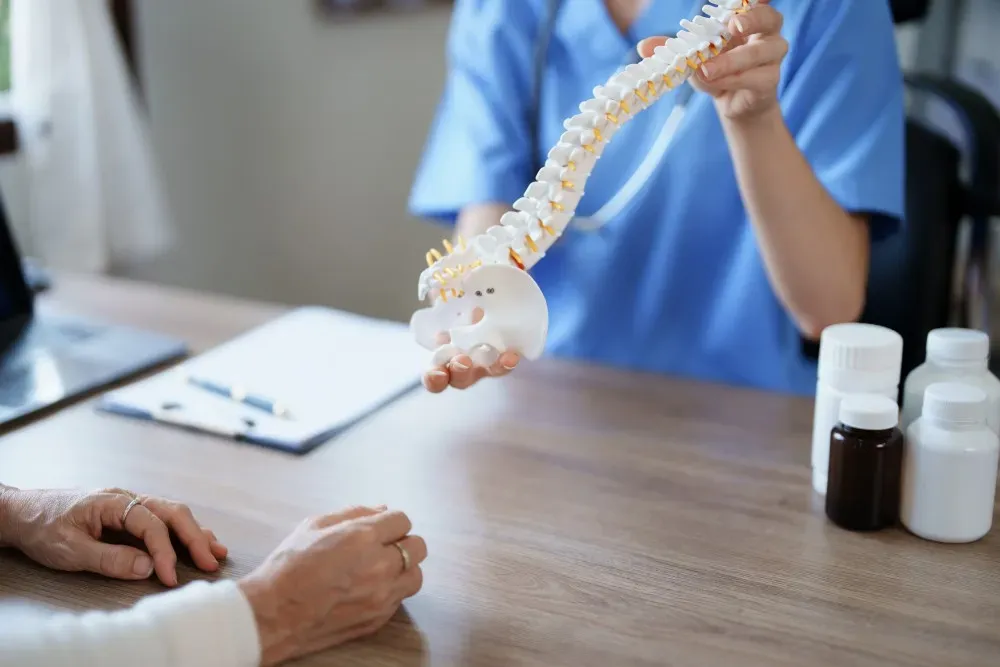Neurosurgery & Orthopedic Surgeons in Jacksonville

What Neck Injuries Do Car Accidents Cause?
Car accidents are a primary cause of neck injuries, with more than 80,000 car crashes with neck injuries reported in the U.S. annually.
Car accidents are a primary cause of neck injuries, with more than 80,000 car crashes with neck injuries reported in the U.S. annually. All too often, accident-related neck injuries are mistreated or untreated, leading to long-term pain, suffering and disability. Keep reading to learn more about the types of neck and cervical spine injuries that occur during car crashes and the signs to be aware of if you’re involved in an accident.
WHAT HAPPENS TO THE NECK DURING A CAR ACCIDENT?
Despite it being a very vulnerable part of the body, the neck is not well-protected during a car crash. While your body is held in place by a seatbelt, your head and neck are unrestrained at the moment of impact. During a collision, your neck may jerk back and forth, jerk to one side or be hit by flying debris. Sudden, rapid movement can cause serious injury to the muscles, tendons, ligaments, joints and nerves in the cervical spine.
Additionally, if you sense a collision before it happens, your neck muscles will tense in anticipation. They’ll have less give than relaxed muscles, which can cause increased muscle strain during impact.
NECK INJURY SIGNS AND SYMPTOMS
It may take several hours or even days after an accident for signs and symptoms of a neck injury to appear. Seek medical help if you experience the following:
- Neck pain and stiffness
- Pain that radiates to the shoulders, arms and hands
- Tingling, numbness or weakness in the arms, hands and fingers
- Dizziness
- Headaches
Don’t ignore pain after a car crash, even if it’s minor. Left untreated, a small neck injury now could cause into chronic pain and long-term complications down the road.
COMMON INJURIES
Car crashes can cause a range of neck problems and injuries. These are the most common:
1.) Whiplash. Whiplash occurs when the head and neck jerk forward and backward in a sudden motion. The movement causes straining, tearing and damage to ligaments, muscles, nerves and connective tissues in the neck. A rear-end collision is the most common type of accident to result in whiplash. Symptoms may present immediately after the crash or they may not appear until hours later. With early treatment, many whiplash cases resolve within a few weeks. However, some cases cause chronic pain, long-term headaches or memory issues for months or years after the accident.
2.) Soft tissue damage. Car crashes can tear, sprain or strain the ligaments, muscles and tendons in the neck. Soft tissue damage usually causes pain, tenderness and stiffness in the neck and shoulders. A muscle strain can also cause reduced movement of the neck and muscle spasms.
3.) Slipped or herniated disc. A high-impact collision can cause intervertebral discs in the cervical spine to slip out of place from between vertebrae. When this happens, the injured disc may compress nerves in the spinal cord. A pinched nerve causes pain, weakness, tingling and numbness in the neck, shoulders, arms, hands and fingers.
4.) Facet joint injury. The facet joints in the cervical spine aid in head and neck stabilization and mobility. Impact from a car collision can inflame and irritate the facet joints. A collision could also damage surrounding ligaments, which could affect movement and range of motion of the joints.
5.) Neck fracture. A neck fracture is a significant injury that causes severe pain. You will likely know immediately if you have a fracture following a car accident. If you suspect you have a fracture, do not move without medical assistance. Improper movement could injure your spinal cord and cause paralysis.
6.) Cuts and lacerations. During a car crash, debris, glass or objects in the car may fly up and hit the neck, causing cuts, abrasions, lacerations and bruising. Deep cuts or lacerations have the potential to damage ligaments and tendons in the neck.
LONG-TERM COMPLICATIONS
Left untreated, accident-related neck injuries can cause chronic, systemic issues down the road. Whiplash is often misdiagnosed or ignored as a significant injury, and as a result many people suffer from whiplash-associated disorders (WAD) for months or years after an accident. WAD can include chronic neck and back pain, frequent headaches, cognitive issues and mental disorders like depression and anxiety.
Any neck injury can cause long-term symptoms and complications if it isn’t diagnosed and treated early. In the future, chronic back and neck pain can negatively impact all areas of your life. If you’re suffering from a long-term injury, you may find it difficult to concentrate at work, perform vigorous activities or sleep well. Chronic pain can be incredibly isolating and cause anger, depression and anxiety.
SEEK HELP FOR ACCIDENT-RELATED NECK INJURIES
In order to avoid long-term pain, damage and disability, seek medical attention if you’ve been in an accident, even if you don’t feel pain or symptoms. Symptoms may not appear until hours or days later.
It’s equally important to choose the right medical provider after an accident. Many PCPs don’t have the training and experience to identify, diagnose and treat car crash injuries. Instead, you need to find a specialist with expertise in accident injuries and treatments. At Integrity Spine and Orthopedics, our team of board-certified doctors specializes in treating acute and chronic back, joint and musculoskeletal conditions.
After a car crash, we’ll be able to accurately diagnose you and get you started on a treatment plan right away. Our goal is to combine compassionate care with the latest advancements in medical knowledge and treatment techniques to get you pain-free and back to doing the activities you love.
Call us at 904-456-0017 or fill out an online contact form to schedule an appointment.




